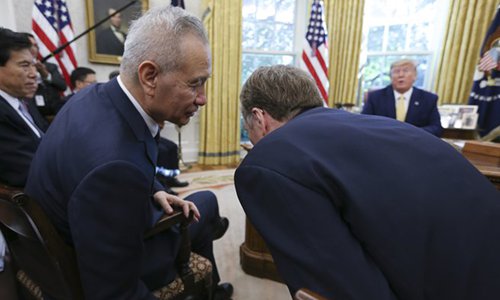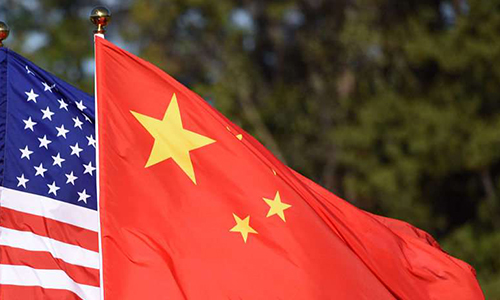HOME >> SOURCE
Upcoming trade deal marks milestone in trade talks: Chinese analysts
Source:Global Times Published: 2020/1/9 16:32:03 Last Updated: 2020/1/10 9:50:39
Move marks milestone in trade talks, but tensions linger: Chinese analysts

Chinese Vice Premier Liu He speaks with US Trade Representative Robert E. Lighthizer during a meeting with President Donald Trump in the Oval Office of the White House on October 11, 2019 in Washington, DC. Photo: IC
Chinese Vice Premier Liu He will lead a delegation to Washington next week to sign the phase one trade agreement with the US, China's Ministry of Commerce (MOFCOM) said Thursday.The signing will bring an end to weeks of work on the deal and mark a milestone in negotiations to resolve the long-running trade war.
While the interim agreement delivers some relief to the world economy amid rising trade and geopolitical uncertainties, it only represents a new beginning for Beijing and Washington in addressing their profound differences on a wide range of issues, and tensions between the two biggest economies will likely persist, Chinese analysts said.
At the invitation of the US side, Liu and his delegation will visit Washington from Monday to Wednesday to sign the phase one agreement, Gao Feng, MOFCOM spokesperson, told a press briefing in Beijing.
Officials were still in close contacts over specific arrangements for the signatures, Gao said.
Done deal
"What this means is that both sides have wrapped up the final work on the deal and are ready for the final part of the process - their signature," Gao Lingyun, an expert at the Chinese Academy of Social Sciences in Beijing, told the Global Times. "The rest is just a show now."
After agreeing on the text of the phase one deal in mid-December, Chinese and US officials have been putting the final touches on the agreement, including legal and translation reviews of the text as well as arrangements for the signing ceremony.
Under the deal reached on December 13, the US has committed to roll back tariffs on Chinese products in phases and China will increase purchases of US products based on market demand. Chinese officials have said the final text will be released after being signed.
The MOFCOM announcement on Thursday ended intense speculation over the arrangement. Some had suggested a deal could be signed by the leaders of the two countries at the World Economic Forum later this month. US President Donald Trump previously tweeted "I will be signing" the deal at the White House on January 15.
The decision to send the vice premier was due to pragmatic considerations that a signing between such a level of officials was simpler and means the deal could be signed sooner, said Huo Jianguo, vice chairman of the China Society for World Trade Organization Studies in Beijing.
"We shouldn't read too much into this," Huo told the Global Times. "This is just a phase one agreement. It does not require the two leaders to sign it personally.
"The most important part is that both sides have taken a very positive step that is good for both economies as well as the world," he noted.
The Thursday announcement came hours after Trump said the US was ready to embrace peace after days of tensions over Washington's killing of a top Iranian general which prompted retaliatory strikes by Iran on US military bases in Iraq.
The tensions have cast a dark cloud over the world economy, as oil prices skyrocketed and investors dove for safe haven assets such as gold.
The seemingly cooling tensions between Washington and Tehran following Trump's comment as well as the phase one trade deal between China and the US offered breathing space for global growth, Chinese analysts said.
Following Trump's address and China's announcement on Thursday, US stocks opened higher, with the Dow Jones Industrial Average index up 0.4 percent and the S&P 500 up 0.5 percent. The NASDAQ gained 0.8 percent at market opening.
However, just as tensions remain high in the Middle East, challenges remain between China and the US, they said, given Washington's stubborn hostility toward China on a wide range of areas, from trade to technology, to security.

Photo: Xinhua
Lingering challengesAll the deal did was to "just bring some certainty at this very stage," He Weiwen, a former senior Chinese trade official, told the Global Times on Thursday. "Its long-term effects remain to be seen."
What happens next "could be much more complex and difficult," He said.
After signing the phase one deal, Chinese and US officials face the immediate predicament over when to start phase two negotiations even as they try to execute the phase one deal, Huo said. "This is far from over, not even for the phase one talks."
Some US officials have suggested phase two talks will start immediately after phase one, but Chinese officials have maintained the second phase of consultations depend on the implementation of phase one.
"Things could get even more complex as politics in the US during the election season will likely put pressure on the trade talks," Huo said.
The move opens a rare opportunity for continued talks, Gao Lingyun said.
"As we like to say in China, the beginning is always the hardest, but now China and the US have overcome that difficult step," he noted.
Newspaper headline: China, US to sign phase one deal next week
RELATED ARTICLES:
Posted in: ECONOMY,BIZ FOCUS